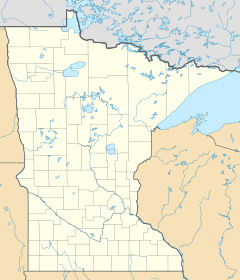Sand River (Pike River tributary) facts for kids
The Sand River is a small river located in the state of Minnesota, in the United States. It flows through St. Louis County and is an important part of the local water system. The Sand River eventually joins the Pike River, which then flows into larger bodies of water.
Quick facts for kids Sand River |
|
|---|---|
|
Mouth of Sand River
|
|
| Country | United States |
| State | Minnesota |
| County | St. Louis |
| Physical characteristics | |
| Main source | Biwabik, Minnesota 47°37′34″N 92°35′08″W / 47.6260353°N 92.5854574°W |
| River mouth | Britt, Minnesota 47°38′11″N 92°25′11″W / 47.63639°N 92.41972°W |
Contents
Where Does the Sand River Flow?
The Sand River is located in the northern part of Minnesota. It starts its journey near a town called Biwabik, Minnesota. This is where the river begins to gather water.
The River's Path
From its start, the Sand River flows through different areas. It travels across St. Louis County. This county is known for its many lakes and forests.
Joining Other Waters
The Sand River does not flow into the ocean directly. Instead, it is a "tributary." This means it flows into another, larger river. The Sand River joins the Pike River.
The End of Its Journey
The Sand River meets the Pike River near a place called Britt, Minnesota. From there, the water continues its journey through the Pike River. Eventually, this water will reach even larger bodies of water, like the Great Lakes or Hudson Bay, depending on the exact river system.
Why Are Rivers Like the Sand River Important?
Rivers are very important natural features. They provide water for plants and animals. They also help shape the land around them over many years.
Home for Wildlife
Many different kinds of animals live in and around rivers. Fish, birds, and other creatures depend on the river for their homes and food. The Sand River supports the local wildlife in its area.
Natural Waterways
Rivers act like natural highways for water. They collect rainfall and melting snow. This water is then carried from higher ground to lower areas. They are a key part of the Earth's water cycle.
Connecting Communities
Historically, rivers were important for travel and trade. Even today, they connect different parts of the landscape. They are a valuable natural resource for the regions they flow through.
 | Claudette Colvin |
 | Myrlie Evers-Williams |
 | Alberta Odell Jones |


